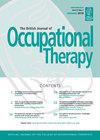日本精神科日托患者活动信息与个人康复及相关心理社会因素的关系
IF 1.3
4区 医学
Q3 REHABILITATION
引用次数: 0
摘要
简介:精神科日托服务在日本社区护理中发挥着核心作用。康复和相关的社会心理因素对于促进精神疾病患者的社区参与至关重要。本研究旨在揭示日托儿童活动信息与个人康复及相关心理社会因素之间的关系。方法:40名日托对象填写自我报告问卷。采用康复评估量表、职业问卷、感知贬值歧视量表和世界卫生组织生活质量(QOL) 26项量表。分析了各因素之间的相关性。结果:对35人的数据进行了分析。总恢复评分与WHOQOL-26总评分呈显著正相关(r = 0.76, p <0.001)。总生活质量评分与活动量呈正相关(r = 0.46, p <0.05)。社会生活质量与耻感总分呈显著负相关(r = - 0.44, p <0.05)。结论:建议参与活动,提高生活质量。虽然康复和生活质量之间有很强的关系,但不清楚参加活动与康复的关系有多大。我们应该考虑其他因素,以充分实现社会融合和个人康复。本文章由计算机程序翻译,如有差异,请以英文原文为准。
The relationships among activity information, personal recovery, and related psychosocial factors in psychiatric day-care users in Japan
Introduction: Psychiatric day-care services play a central role in community-based care in Japan. Recovery and related psychosocial factors are critical in promoting community participation of people with mental illness. This study aimed to reveal the relationships among activity information, personal recovery, and related psychosocial factors in day-care users. Method: Forty day-care participants answered self-report questionnaires. The following assessments were applied: Recovery Assessment Scale, Occupational Questionnaire, Perceived Devaluation Discrimination Scale, and 26-item version of World Health Organization Quality of Life (QOL). The correlations among the factors were analyzed. Results: Data for 35 people were analyzed. Total recovery score was strongly correlated with total WHOQOL-26 score ( r = 0.76, p < 0.001). Total QOL score was positively related with the value of activities ( r = 0.46, p < 0.05). Social QOL and total stigma score had a significant negative relationship ( r = −0.44, p < 0.05). Conclusion: Participation in activities was suggested to improve QOL. Although there was a strong relationship between recovery and QOL, it was unclear to what extent participation in activities was related to recovery. We should consider approaches regarding other factors to fully accomplish community integration and personal recovery.
求助全文
通过发布文献求助,成功后即可免费获取论文全文。
去求助
来源期刊

British Journal of Occupational Therapy
REHABILITATION-
CiteScore
2.20
自引率
15.40%
发文量
81
审稿时长
6-12 weeks
期刊介绍:
British Journal of Occupational Therapy (BJOT) is the official journal of the Royal College of Occupational Therapists. Its purpose is to publish articles with international relevance that advance knowledge in research, practice, education, and management in occupational therapy. It is a monthly peer reviewed publication that disseminates evidence on the effectiveness, benefit, and value of occupational therapy so that occupational therapists, service users, and key stakeholders can make informed decisions. BJOT publishes research articles, reviews, practice analyses, opinion pieces, editorials, letters to the editor and book reviews. It also regularly publishes special issues on topics relevant to occupational therapy.
 求助内容:
求助内容: 应助结果提醒方式:
应助结果提醒方式:


